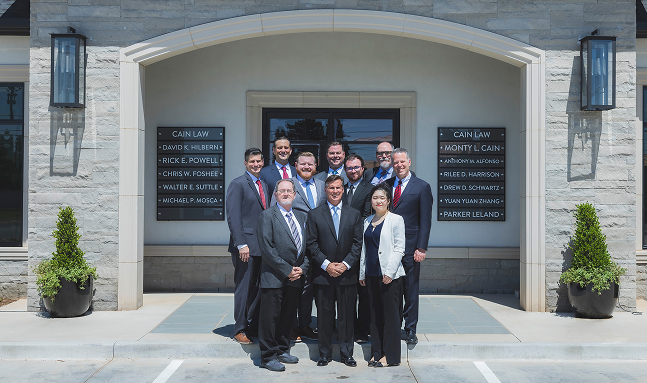
It is usually a difficult decision to move an elderly or infirm loved one into a nursing home. The move may be necessary for them to receive medical care and other assistance they require, but it leaves them vulnerable to the will of nursing home employees and/or other residents.
You may be shocked if a loved one who lives in a nursing home complains or shows signs of elder abuse or neglect, but you should never ignore it. Nursing home abuse is potentially deadly and requires a prompt and strong response. Your actions could prevent harm to other residents.
About Our Nursing Home Abuse Lawyers in Oklahoma City, OK
At Cain Law, our dedicated Oklahoma City nursing home abuse lawyers take these allegations very seriously, and we will take immediate action to protect your loved one.
Nursing Home Abuse & Neglect Damages
In addition to helping you obtain emergency assistance and file appropriate complaints with authorities, we can demand compensation for:
- Medical care related to your loved one’s injuries due to elder abuse or neglect
- Personal and financial losses that your loved one has experienced
- Cost of moving a to a new long-term care facility
- Pain and suffering your loved one endured
- Other expenses related to what your loved one has been put through
Multiple federal and state laws establish the rights of nursing home residents and the elderly. Our nursing home abuse attorneys can investigate your loved one’s treatment while working to protect his or her dignity and legal rights. Our team has more than two decades of experience handling these types of cases, and we provide a superior level of support for our clients.
Do not delay if you suspect a problem in an Oklahoma nursing home, residential care home, assisted-living center, or similar long-term care facility. Contact our personal injury law firm today for a confidential and free consultation.
How to Report Nursing Home Abuse in Oklahoma?
If you believe your loved one has been subjected to elder abuse or neglect in a nursing home or another long-term care facility in Oklahoma, you should take action right away and let our elder home abuse attorneys help. To report nursing home abuse in Oklahoma you need to call 911 and report suspicions, write down what you think is going on, contact Oklahoma State Department of Health and contact a nursing home abuse attorney at Cain Law.
- If the person is in immediate danger, remove him or her from the home and get help, or call 911 for emergency assistance.
- Report suspicions about a resident’s condition or care to a manager at the long-term care facility. Make a verbal report immediately and follow up in writing. Ask for a written response, but do not automatically accept assurances or excuses.
- Write down for your own records your assessment of the resident’s condition and what you believe is going on. Include anything you personally saw or heard, as well as any complaints or comments by the alleged elder abuse victim or others at the facility.
- Contact the Oklahoma Long Term Care Intake and Incident Division at:
Oklahoma State Department of Health
Protective Health Services – 0501
1000 N.E. 10th St.
Oklahoma City OK 73117-1299
Email: LTCComplaints@health.ok.gov
Phone: 1-800-747-8419 or 405-271-6868See the Long Term Care Facility Complaint Procedure online for what will be required of a complaint. - Contact a nursing home abuse attorney. At Cain Law, we thoroughly investigate nursing home abuse and neglect cases to ensure that injured victims’ rights are protected. We demand compensation for any injuries and losses the elderly person has suffered. And we work with the appropriate authorities to ensure complaints are properly documented.
Fighting for the Legal Rights of Elderly Victims of Abuse and Neglect
Although suspected nursing home abuse should be reported to Oklahoma authorities, our skilled nursing home neglect attorney can investigate your case independently and often work faster than overburdened state personnel. Schedule a free consultation today to discuss how our team can take action to protect your elderly loved one.
Understanding the Types of Elder Abuse and Neglect
You should always follow up on a nursing home resident’s complaint of neglect or elder abuse. It does happen, and not always to “someone else.” However, many elderly and infirm adults are unable to communicate effectively, and others may be afraid of worse treatment if they complain. It could be up to you to save a nursing home resident’s life.
To take the action necessary to assist a nursing home resident who is being abused or neglected, you must first recognize what is going on. The National Center on Elder Abuse describes the following as major categories of mistreatment found among the elderly:
This includes inflicting or threatening physical pain or injury. It is physical abuse to hit, slap, kick, strike, grab, push, or pull on nursing home residents as a form of discipline, to capture their attention, or for any other nonmedical reason.
This includes inflicting mental pain, anguish, or distress through verbal or nonverbal acts. This could mean criticizing, scolding, threatening, humiliating, falsely blaming, or otherwise harassing a resident. It also includes isolating a resident or leaving the elderly person out of group activities he or she would like to participate in.
This includes non-consensual sexual contact of any kind, from kissing to fondling or intercourse (rape). It also includes forcing a person to disrobe or covertly watching a person disrobe for purposes of titillation or humiliation; or coercing a person into watching sexual behavior, including pornography. A person unable to understand or communicate due to dementia or another disability cannot legally consent to any form of sexual contact.
This includes stealing, misusing, or concealing funds, property, or assets of a vulnerable elderly person. Unfairly persuading a nursing home resident to change his or her will or beneficiary designations on insurance policies or other financial accounts is also financial exploitation.
This occurs when a nursing home facility or staff fail to provide food, shelter, clothing, hygiene assistance, health care, or safety protection to a nursing home resident. Active neglect is willful failure to fulfill care-taking functions and responsibilities toward a nursing home resident, such as through individual neglect or under-staffing. Passive neglect is non-willful failure because nursing care staff lack knowledge or training, or because they don’t value routine services or care protocol.
Signs & Symptoms of Nursing Home Abuse and Neglect
You may identify signs of nursing home abuse by changes in your loved one’s behavior or physical evidence, including:
- Injuries such as cuts, bruises, sprains, fractures (broken bones), bite marks, or burns
- Lingering sores or wounds
- Untreated illnesses
- Unexplained sexually transmitted disease or HIV
- Torn, soiled, or bloody clothing or bedding
- Poor hygiene (lack of bathing or brushing teeth, unkempt hair, etc.)
- Ligature marks around wrists, ankles, arms, or chest (signs of restraints, which are illegal in nursing homes except in strictly defined situations)
- New and unexplained lethargy or confusion (potential signs of sedatives illegally used as chemical restraints)
- Broken personal items, such as eyeglasses, hearing aids, bedside clocks, radios, TV, etc.
- Sudden changes in alertness, i.e., diminished or hypersensitive
- Withdrawal from activities previously enjoyed
- Becoming uncommunicative
- Sudden changes in eating or sleeping habits
- Fear or agitation in the presence of specific individuals, such as nursing home staff members or certain other residents
- General deterioration of mental and physical health, including clinical depression and cognitive decline
Your family deserves compensation if your loved one was abused or neglected in a nursing home. Our nursing home abuse lawyers are prepared to fight for you and your loved ones.
If you suspect any type of elder abuse or neglect in a nursing home, you should report it right away. Your quick actions may not only protect your loved one, but also other residents who may be at risk of abuse.
Schedule a free consultation with our Oklahoma City nursing home abuse law firm today to learn what steps you should take.
Common Injuries Among Elder Abuse Victims
Unfortunately, many cases of nursing home abuse or neglect go unnoticed by visiting family and friends until the long-term care resident becomes injured or increasingly ill. Among the typical injuries found are:
Bed sores are open flesh wounds caused by remaining in one position for too long. These injuries, also known as “pressure sores” or “decubitus ulcers,” are caused by skin and underlying tissue wearing away. They are terribly painful and potentially deadly because they can become infected. A resident who enters a nursing home without bed sores should never develop one. Nursing home staff should follow established protocols for regularly turning or assisting residents with mobility issues.
Falls are among the most frequent cause of nursing home injury, including potentially deadly injuries such as traumatic brain injury (TBI) or broken hips. TBIs are the leading causes of accidental injury and death among the elderly. Elderly adults seldom fully recover from broken hips. Instead, a broken hip typically leads to steady physical decline and death. Nursing homes should strictly adhere to fall-prevention protocols, including supervision and assistance for residents diagnosed as at-risk.
Insufficient intake of nutrition, whether in the form of food or supplements, leads to malnutrition. Dehydration is lack of water and other fluids required for the body to function normally. Malnutrition and/or dehydration can cause weakness that leads to illnesses or accidents.
Medication errors include administering incorrect medicines, conflicting medications, wrongly timed and/or incorrect doses of medication. These preventable medical errors can cause a variety of complications, not the least of which is leaving an ailment, such as an infection, improperly treated. Medical errors are often caused by poor training or lack of staffing.
If a person chokes and the airway remains obstructed, he or she will suffer loss of consciousness and, eventually, brain damage and death. Chocking is a concern among the elderly or infirm who suffer from “dysphagia,” which is difficulty or inability to swallow. Nursing homes should diagnose dysphagia and employ anti-choking protocols, including strict monitoring of vulnerable individuals.
Nursing home residents on mechanical ventilation are at risk of asphyxiation (lack of oxygen) if breathing tubes are not monitored and maintained on a daily basis. Asphyxiation can quickly lead to loss of consciousness, brain damage, and death. If even one resident of a nursing home requires breathing tubes, or “endotracheal intubation” (EI), there should always be at least one staff member trained to maintain breathing tubes on duty.
Serious burn injuries (third or fourth degree) are potentially deadly, particularly for the elderly. Nursing home residents may suffer burn injuries if exposed to open flame, hot liquids or steam, electrical current, or sunburn. Nursing home residents who are improperly restrained with straps, belts, or ropes may suffer friction burns. In egregious cases of elder abuse, a nursing home resident may be intentionally burned with matches, lighters, cigarettes, etc.
Another issue indicating the potential neglect of nursing home residents is wandering or “elopement,” which means leaving the premises without authorization. Alzheimer’s disease and other forms of dementia cause victims to wander. Nursing homes have a duty to keep residents secure and protect them from the potential injuries that can happen if they wander or elope, such as from falls, exposure to the elements, assault, etc.
Looking for a Nursing Home Abuse Lawyer Near You? Visit our Oklahoma City Office.
our top priority
Nursing Home Negligence Resources
- Oklahoma Department of Human Services, Resources for Older Oklahomans: http://www.okdhs.org/programsandservices/docs/olderoklahomans.htm
- Oklahoma Department of Human Services – Adult Protective Services Agency: http://204.87.68.21/aps/

